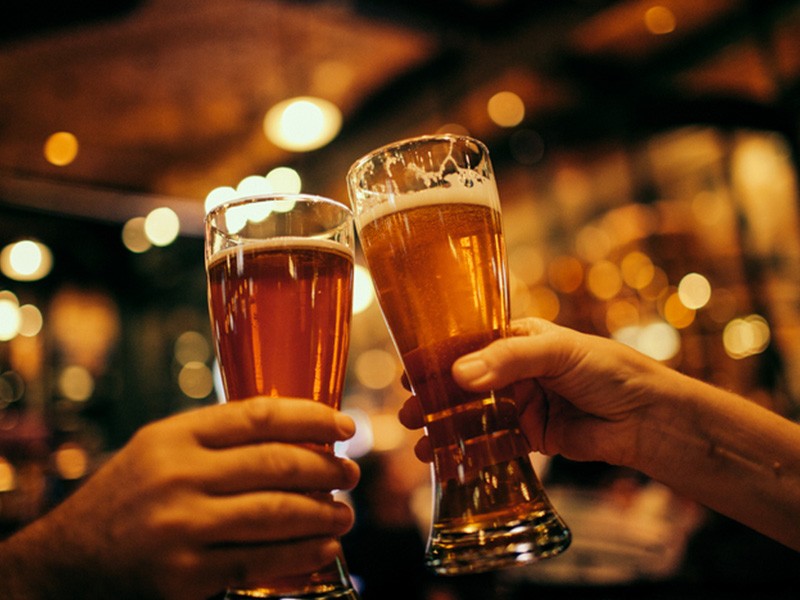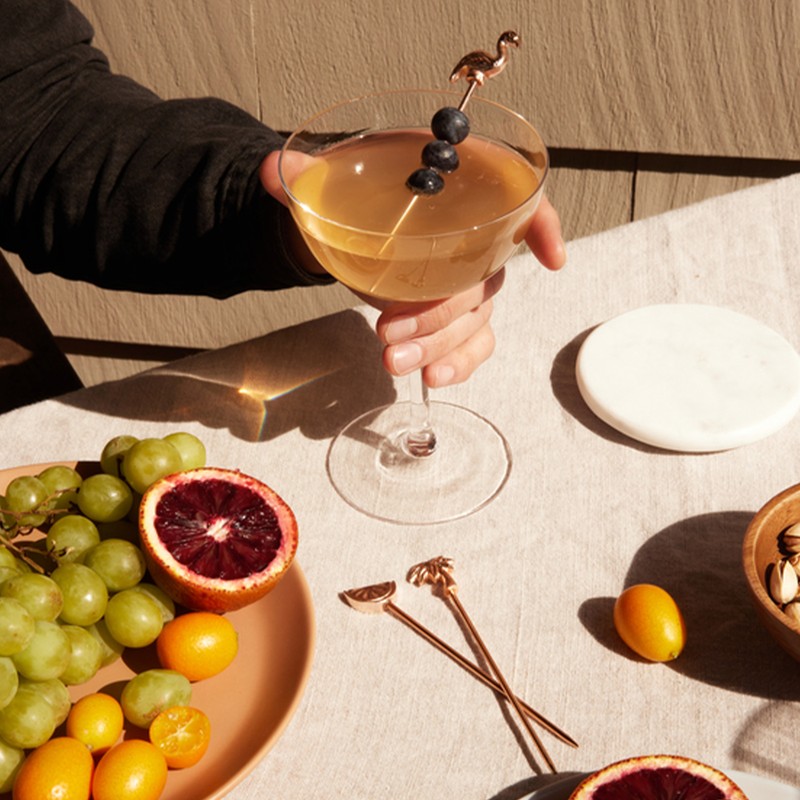The Science Of Boozing
How Alcohol Affects The Body
In The Short Term…
It Impairs Decision Making: “Regardless of the type of alcohol you consume, it all works in the same way. As a potent nervous system depressant, alcohol can quickly impair the chemicals the brain uses to communicate both with itself and the wider nervous system. This, in turn, leads to the common neurological symptoms we associate with having had a few drinks – slurred speech, dizziness, vision impairment, slow reaction times and poor decision making.” – Dr Sam Watts, founder of Mind Body Medical
It Affects Sleep: “Alcohol is considered a somnogen (a sleep-inducing substance), which is why many of us turn to a drink in the evening to aid sleep. The problem with this is that alcohol is a sedative, and sedation is not the same as sleep. Our natural sleep cycle is imperative for optimal brain function, but sedation doesn’t provide the same rewards that natural sleep does. Sleep is essential for overall health – a lack of it has been linked to weight gain, memory loss, depression, anxiety and decreased fertility.” – Chris Barker, nutritional expert
You’ll Wake Up Feeling Groggy: “Alcohol suppresses REM sleep – a stage of sleep that is vital for many reasons, including brain development (notably learning, making and retaining memories) and emotional processing. Plus, alcohol fragments our sleep, causing us to wake more frequently, leading to sleep that is far from restorative. One study found that just two drinks is enough to decrease sleep quality by 24%, while more than two drinks decrease sleep depth by 39%.” – Chris
It Can Wreak Havoc With Your Brain: “Recent research suggests around 15% of us experience ‘hangxiety’ the day after drinking. It all comes down to stress hormones: when we drink heavily, the body moves into a state of physiological stress (like the ‘fight or flight’ response). One of the ways the body tries to remedy this is to increase the secretion of cortisol, our dominant stress hormone, whilst reducing levels of dopamine, our feel-good hormone. This creates the perfect storm for anxiety and stress, nervousness, an inability to concentrate, a sense of impending doom and low mood.” – Sam

In The Long Term…
Immunity Is Affected: “Studies show regular alcohol intake can significantly reduce the impact and protective capacity of the immune system. On a superficial level, even a single evening of overindulgence can increase your risk of respiratory infections. On a more serious level, long-term alcohol use can chronically impair immune function and increase the risk for many cancers, especially oesophageal, head and neck cancers. Globally, 4% of all cancer is now directly attributed to alcohol use. On average, regular drinkers experience a 1.8-fold increased risk of developing the disease.” – Sam
It Can Trigger IBS: “Alcohol damages the gut, which can in turn lead to dysbiosis – i.e. an imbalance of the good and bad bacteria in your gut. Increasing studies have linked gut dysbiosis to insomnia, which increases your risk of both IBS and IBD.” – Chris
It Takes Its Toll On The Liver: “Remember alcohol is a toxin, which becomes increasingly toxic to our bodies as the rate we can metabolise it slows. Additionally, as you age, you produce fewer of the enzymes that break down alcohol, which contributes to higher concentrations of alcohol in the blood.”
Want To Cut Back? Try These Expert-Approved Tips…
Pour And Move
“If you drink alcohol with the bottle next to you, it encourages excess. It’s far too easy to top up your glass quickly and mindlessly. To counter this, open and pour your drink in the kitchen and then leave the bottle there and carry your glass to wherever you plan to enjoy your drink. This makes it far less likely you will engage in mindless drinking, and studies show it can help reduce total alcohol consumption.” – Sam
Only Drink With Food
“This is arguably the most effective and important rule of them all. Research shows when alcohol is only consumed with food, the side effects are reduced and on average less alcohol is consumed.” – Sam
Set A Safe Number
“Everyone has a ‘safe’ number of drinks – for most of us it’s somewhere between two to four drinks. Work out what your number is, then minus one drink – for example aim for two drinks if your safe number is two to three. You’ll feel better when you have a plan and are more likely to stick to it. It can also help to shake up your routine to break out of old patterns, for example meet people at different times of the day or different places. Only say yes to events where you know you can stay in control.” – Ailsa Frank, alcohol reduction hypnotherapist
Fake It
“Trick yourself and others into drinking less when out socially by always starting with a glass of water. If you ask for an alcoholic drink with a glass of water no one ever seems to mind. Later on, a sparkling water with a slice of lime can look like a vodka and soda, and an apple juice with soda water can look like beer.” – Ailsa
Switch Your Mindset
“Visualise your life as a non-drinker and see yourself living a more sober life. Visualise yourself as a successful person dropping in on a social event but leaving on time. In your mind, see your week going well with you relaxed and in control without alcohol. Imagine it is the end of the week, you are looking back at a successful and calm week behind you. By visualising positive outcomes, you are less likely to drink. Sports people often use similar techniques to increase performance.” – Ailsa
Take Back Control
“You may have spent many years creating your drinking habits, now you need to invest time to reprogram yourself. Visualise a red triangle in your mind and imagine putting all the drinks you have ever had in your life and all the times you were around drink into the triangle. Then shrink the triangle and the alcohol down in your mind until it is so small it is the size of a speck of dust. Imagine blowing away the speck of dust and the excess alcohol. Repeat this exercise until you feel better. By taking control of your thoughts, you will break the habit of craving alcohol and overtime you will program your mind to feel in control of your thoughts.” – Ailsa
Set Realistic Goals
“A great first step can be to set yourself a goal, whether that’s for the next week, month or however long. Good goals are specific and a little bit challenging, but also achievable. Your goals could be based on a maximum number of units – if you don’t know where to start, start with the UK low-risk drinking guidelines, which recommend we drink no more than 14 units (around six pints of beer, or six medium glass of wine, or seven double G&Ts) spread across the week, not in one go, keeping a few alcohol-free days each week. Keep a diary to track your progress.” – Ruari Fairbairns, CEO at One Year No Beer
Avoid Triggers
“Some of us drink as a way of dealing with stress. Try to identify what situations result in you reaching for the bottle and find alternative ways to relax, such as deep breathing, a hot drink or chewing gum. It also may sound simple but learning to say no is a powerful tool. If you’re a people pleaser, saying no can be hard. Creating strong boundaries will make you feel better about yourself by taking back your power and helping you stick to your goals. If someone insists on buying you a drink, just say no. And if they won’t take no for an answer, either leave the drink or leave the situation.” – Marisa Peer, therapist & author
Ailsa Frank offers personalised alcohol reduction hypnotherapy sessions either virtually or face-to-face on Harley Street – visit AilsaFrank.com for more information. For more, also head to Mind-Body-Medical.co.uk, LifestyleClinicLondon.com, OneYearNoBeer.com & MarisaPeer.com
DISCLAIMER: Features published by SLMan are not intended to treat, diagnose, cure or prevent any disease. Always seek the advice of your GP or another qualified healthcare provider for any questions you have regarding a medical condition, and before undertaking any diet, exercise or other health-related programme.
DISCLAIMER: We endeavour to always credit the correct original source of every image we use. If you think a credit may be incorrect, please contact us at [email protected].


